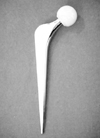Abstract
Purpose
We believe that cemented femoral stems will relieve the stiffness of ceramic-based bearings, resulting in reduced complication of ceramic-on-ceramic bearing total hip arthroplasty (THA). The purpose of this study was to evaluate the midterm effect of ceramic-on-ceramic bearing THA using cemented femoral stems.
Materials and Methods
We studied 32cases (30 patients) of THA using ceramic-on-ceramic bearing cemented femoral stems and 33 cases (31 patients) of THA using ceramic-on-ceramic bearing cementless femoral stems. All total hip arthroplasties were performed between January 2004 and December 2005 and were followed up for more than 5 years. The clinical results and radiographic results were evaluated.
Results
The mean HHS improved from points pre-operatively to points at the last follow-up in both the cemented and cementless stem groups (P<0.05). The mean WOMAC score also improved from points pre-operatively to points at the last follow-up in both the cemented and cementless stem groups (P<0.05). But no statistically significant difference was noted between the cemented and cementless stem groups in HHS and WOMAC scores (P=0.304, P=0.769). There were 3 patients with a sense of discomfort on ambulation and 5 patients with thigh pain in the cementless stem group and no cases in the cemented stem group. There was no instance of acetabular loosening in either group. Subsidenc of the cemented femoral stem was less than 1mm in 30 cases and less than 2 mm in 2 cases. All cementless femoral stems acquired firm bony union.
Figures and Tables
 | Fig. 168-Years old female, patient was operated by ceramic-on-ceramic total hip arthroplasty using cementless stems due to degenerative osteoarthritis. (A) Preoperative, (B) postoperative 1-year follow-up and (C) last follow-up radiography was showed. Last follow up radiography was showed remodeling trabeclula on proximal femur. But patient complained uncomfortable sense of right hip and pain of thigh on ambulation. |
References
1. Older J. Charnley low-friction arthroplasty: a worldwide retrospective review at 15 to 20 years. J Arthroplasty. 2002. 17:675–680.
3. Boutin P. Total arthroplasty of the hip by fritted aluminum prosthesis. Experimental study and 1st clinical applications. Rev Chir Orthop Reparatrice Appar Mot. 1972. 58:229–246.
4. Hasegawa M, Sudo A, Hirata H, Uchida A. Ceramic acetabular liner fracture in total hip arthroplasty with a ceramic sandwich cup. J Arthroplasty. 2003. 18:658–661.

5. Yim SJ, Yoo JH, Seo YS, Kim BS, Jung KJ, Seo YS. Results of ceramic on ceramic bearing total hip arthroplasty using cemented femoral stem and cementless femoral stem. J Korean Hip Soc. 2008. 20:169–175.

6. Bellamy N, Buchanan WW, Goldsmith CH, Campbell J, Stitt LW. Validation study of WOMAC: a health status instrument for measuring clinically important patient relevant outcomes to antirheumatic drug therapy in patients with osteoarthritis of the hip or knee. J Rheumatol. 1988. 15:1833–1840.
7. DeLee JG, Charnley J. Radiological demarcation of cemented sockets in total hip replacement. Clin Orthop Relat Res. 1976. 121:20–32.

8. Callaghan JJ, Dysart SH, Savory CG. The uncemented porous-coated anatomic total hip prosthesis. Two-year results of a prospective consecutive series. J Bone Joint Surg Am. 1988. 70:337–346.

9. Barrack RL, Mulroy RD Jr, Harris WH. Improved cementing techniques and femoral component loosening in young patients with hip arthroplasty. A 12-year radiographic review. J Bone Joint Surg Br. 1992. 74:385–389.

10. Harris WH, McCarthy JC Jr, O'Neill DA. Femoral component loosening using contemporary techniques of femoral cement fixation. J Bone Joint Surg Am. 1982. 64:1063–1067.

11. Engh CA, Massin P, Suthers KE. Roentgenographic assessment of the biologic fixation of porous-surfaced femoral components. Clin Orthop Relat Res. 1990. 257:107–128.

12. Gruen TA, McNeice GM, Amstutz HC. "Modes of failure" of cemented stem-type femoral components: a radiographic analysis of loosening. Clin Orthop Relat Res. 1979. 141:17–27.
13. Wagner M, Wagner H. Medium-term results of a modern metal-on-metal system in total hip replacement. Clin Orthop Relat Res. 2000. 379:123–133.

14. Jacobs JJ, Rosenbaum DH, Hay RM, Gitelis S, Black J. Early sarcomatous degeneration near a cementless hip replacement. A case report and review. J Bone Joint Surg Br. 1992. 74:740–744.

15. Langkamer VG, Case CP, Collins C, et al. Tumors around implants. J Arthroplasty. 1997. 12:812–818.

16. Park YS, Moon YW, Lim SJ, Yang JM, Ahn G, Choi YL. Early osteolysis following second-generation metal-on-metal hip replacement. J Bone Joint Surg Am. 2005. 87:1515–1521.

17. Archibeck MJ, Jacobs JJ, Black J. Alternate bearing surfaces in total joint arthroplasty: biologic considerations. Clin Orthop Relat Res. 2000. 379:12–21.
18. Synder M, Drobniewski M, Kozlowski P, Grzegorzewski A. Ceramic-ceramic articulation in uncemented total hip arthroplasty. Wiad Lek. 2005. 58:193–197.
19. Boutin P, Christel P, Dorlot JM, et al. The use of dense alumina-alumina ceramic combination in total hip replacement. J Biomed Mater Res. 1988. 22:1203–1232.

20. Mittelmeier H, Heisel J. Sixteen-years' experience with ceramic hip prostheses. Clin Orthop Relat Res. 1992. 282:64–72.

22. Hwang SK, Jeon JS, Lee BH. Ceramic on sandwich ceramic bearing primary cementless total hip arthroplasty (result of 2 to 5 years follow up). J Korean Orthop Assoc. 2004. 39:679–685.

23. Willmann G, Kramer U. Ceramic cups for hip endoprostheses. 5: Consideration of designs. Biomed Tech (Berl). 1998. 43:342–349.
24. Nevelos J, Ingham E, Doyle C, et al. Microseparation of the centers of alumina-alumina artificial hip joints during simulator testing produces clinically relevant wear rates and patterns. J Arthroplasty. 2000. 15:793–795.

25. Ha YC, Cho SH, Jeong ST, et al. Total hip arthroplasty using sandwich type ceramic-ceramic articulation: minimal 2 years follow-up. J Korean Orthop Assoc. 2005. 40:640–645.

26. Maloney WJ, Jasty M, Burke DW, et al. Biomechanical and histologic investigation of cemented total hip arthroplasties. A study of autopsy-retrieved femurs after in vivo cycling. Clin Orthop Relat Res. 1989. 249:129–140.




 PDF
PDF ePub
ePub Citation
Citation Print
Print




 XML Download
XML Download